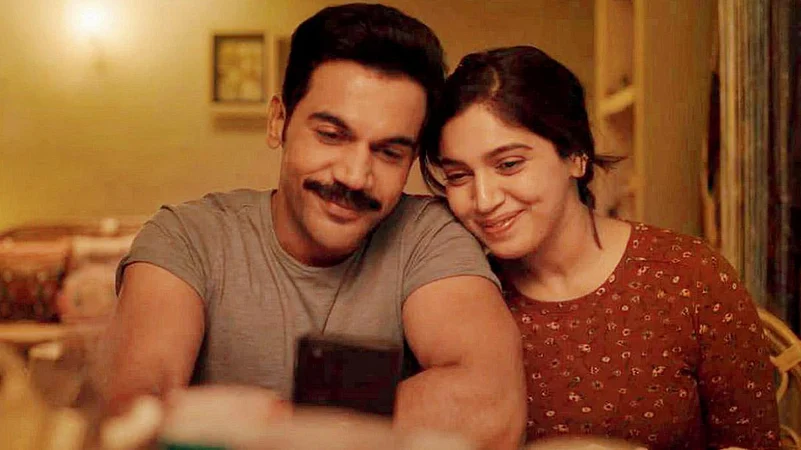People have been raving about actor Rajkummar Rao and actress Bhumi Pednekar's performance in their latest release ‘Badhaai Do’. The film puts light on the lives of Suman Singh and Shardul Thakur, who marry each other to escape their families' incessant inquisitiveness about their personal lives. Suman is a lesbian, and Shardul is a homosexual, and they enter into a thing called a ‘lavender wedding’ to keep inquisitive eyes away from their lives. While many people are unaware of lavender weddings, it is a reality in India that has been obscured by generations of cultural judgments. Let’s have a limpid glance at what it is all about.
For the unversed, a Lavender wedding is a marriage of convenience in which two people from the LGBTQ community, a man and a woman, agree to marry each other in order to appear to society as a heterosexual couple. The purpose for this is to be able to live a tranquil life with their homosexual partner in secret so that their conservative family members do not intrude and cause physical, mental, or emotional issues in their lives.
Talking about the same, ‘Badhaai Ho’ director Harshavardhan Kulkarni says, “My co-writers, Suman Adhikary and Akshat Ghildial brought the concept, as they had read about it somewhere. Apparently, the concept of Lavender weddings is very prevalent in China. A bit more of research into it, and they found out that it was very prevalent and something could be done around it. That’s how the concept came forth. It is there in India as well. It is basically a marriage of convenience where people know that I am queer but she or he is also benefitting from it in some way. It can also happen between people who probably have some other issue or probably don’t just want to get married. But definitely, it’s there in India. People told us that they know people who are sort of a lavender wedding, but the people themselves aren’t coming out in the open and saying that they’re in a lavender wedding. People from the queer community told us that it was very common.”
The script consultant on ‘Badhaai Do’, Manish Gaekwad, also adds to the thought. “The story was written by Akshat and Suman, and then even Harshavardhan, and they all thought that they wanted a person from the queer community as the story was about queer people. They felt they needed perspective, and that’s where I came in. I know people who’re into Lavender weddings. However, I am personally not into such an arrangement,” says Gaekwad.
Even after the groundbreaking decision to decriminalise Section 377 of the IPC, many LGBTQ people still find it difficult to come out in front of their families. There is a sense of social stigma attached to one’s sexual orientation. Kulkarni adds, “People would lie about their sexual orientation. After the marriage, the partner would find out, and that’s tragic for everyone. And that would be a lie. There would be no intimacy. People would stay that way for several years and then come out in the open. So as not to get into that situation and cheat anyone, so you kind of look around for a person who is also from the queer community, get married to that person, and then it’s chilled. At least you know internally what the setup is. We lead our lives like roommates. We don’t even have to sleep in the same bed and can have our own separate rooms. Just to exist, and keep a face for the family. It is a complete tragic situation, still.”
Speaking about the same, Psychiatrist Utkarsh Mankad says, “What we think and what we see, it’s exactly what’s happening in reality. Opening up (about your sexual orientation) to your family or anyone is not easy. It’s a very awkward communication to have with your partner or your friends or family. People who’re in the LGBTQ, they even don’t tell it to their siblings even if they are very close and very friendly with their siblings.”
Many such people find it difficult to live a pleasant life since they do not have the chance or space to be open about their sexual orientation. The majority of individuals in India are expected to marry someone appropriate (of the opposite gender), have children, and settle down. For some, the prospect of marrying or living with someone of the same gender remains a nightmare.
People in most regions of India are unable to embrace who they truly are due to long-held beliefs that are strongly ingrained in our society. LGTBQ individuals are afraid of being rejected and disgraced by society and family, thus many of them conceal their sexual orientation. That is what the Lavender wedding is all about.
A Lavender wedding serves as a cover for persons who are willing to officially commit to and marry somebody of the opposite sex in order to covertly enjoy a happy life with their gay partner. While this may not be the independence that many individuals seek, it is a viable option in India. Individuals from typical traditional and conservative households encounter this difficulty, and their circumstances frequently force them into such a marriage of convenience.
“The concept has been there forever, I suppose. As long we are comfortable as a society to accept people for who they are, it will always exist. In general, most marriages have become like that nowadays as a marriage of convenience,” adds Gaekwad.
Kulkarni feels that the coming out of the closet is never finished. “Once you come out to your family, you’re not out of the closet, but your family also gets into the closet. Then you tell your friends, and even they come into the closet. It’s never that you’re coming out to the world, and you’re constantly coming out always. It’s a journey, and it will continue till the time society doesn’t embrace them and give them confidence saying that ‘I will not judge you. You are what you are. I have nothing to do with it,” says Kulkarni.
While previously such a notion would have been outright rejected by audiences, even if it was shown on celluloid. However, as times are changing, films are slowly becoming more and more realistic. That’s why a film like ‘Badhaai Do’ is accepted by audiences without a lot of fuss and opposition.
Gaekwad, however, maintains that the future will continue to be the same way as there might not be too much of a change. “Think about it, why would they want to talk about it (lavender wedding) openly. They would be comfortable with their spouses, but I am not sure, if people would want to talk about it openly even in the coming future,” adds Gaekwad.
Mankad on the same, says, “It’s a very novel concept. It a still very pragmatic. Most of the time when a homosexual guy would want to get married to a girl, he would not want her to know, and he would want her to play the role that any guy would play. There is an aspect of deceit involved here. But I am not judging because you have to know from where this is coming. The expectation to get married in India is not their own.”
Honestly, the issue is real, and there is no doubt that people all over the country are facing this social stigma about opening up and accepting their sexuality. While the concept of a lavender wedding still is something that people in urban settlements would connect to, when a film with popular leading actors showcase and talks about the issue at large, the message somewhat gets spread across to even the rural parts of the country. Let’s wait and watch whether ‘Badhaai Do’ is able to get the underlying message across to every part of the country or not.



























